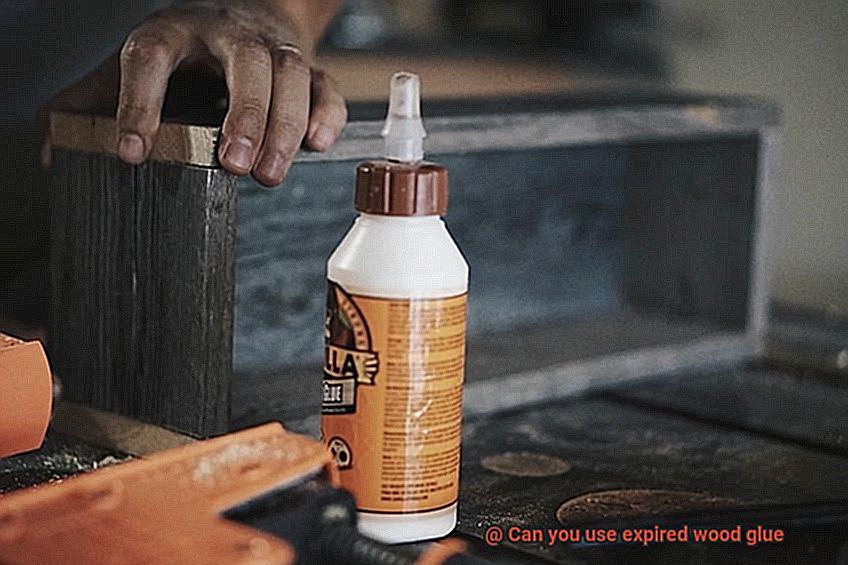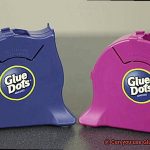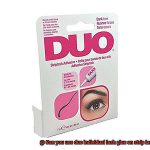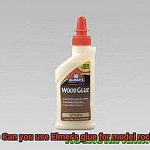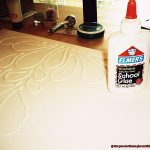Picture this: you’re rummaging through your workshop, and there it is – a forgotten bottle of wood glue, its expiration date a distant memory. As a craftsman or DIY enthusiast, you can’t help but wonder: can you still use expired wood glue? The success of your creative endeavors hinges on the longevity and effectiveness of this adhesive, leaving you torn between tossing it out or giving it one last chance.
Today, we’re diving headfirst into the world of expired wood glue to uncover the truth behind this sticky dilemma. In this no-nonsense blog post, we’ll explore what factors affect the usability of expired wood glue, expose any potential risks involved, and arm you with expert tips for extending the lifespan of your trusty adhesive. So buckle up and get ready as we unravel the mystery surrounding expired wood glue and empower you to make savvy choices for all your woodworking projects.
What is Expired Wood Glue?
Contents
- 1 What is Expired Wood Glue?
- 2 Why is Using Expired Wood Glue Not Recommended?
- 3 What Are The Negative Effects of Using Expired Wood Glue?
- 4 How To Determine If Your Wood Glue Is Expired?
- 5 Is It Safe to Use Slightly Expired Wood Glue?
- 6 How To Maximize Performance When Using Fresh, Non-Expired Wood Glue?
- 7 What Are The Best Practices for Storing and Disposing of Expired Wood Glue?
- 8 Conclusion
Wood glue is an indispensable tool in woodworking, providing the necessary bond to create strong and durable wooden structures. However, using expired wood glue can have detrimental effects on your projects. In this article, we will delve into the concept of expired wood glue, its impact on woodworking projects, and the importance of checking the expiration date before use.
Can you use expired wood glue?
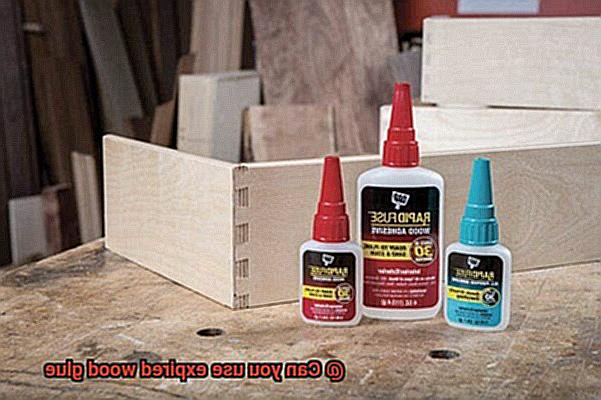
The straightforward answer is no. Here’s why:
Changes in viscosity:
Over time, wood glue can thicken and lose its fluidity as the water content evaporates. This change in viscosity makes it challenging to spread the glue evenly, resulting in weak joints and uneven bonding.
Deterioration of chemical composition:
As wood glue ages, its chemical composition can deteriorate. The breakdown or degradation of polymers within the glue leads to a loss of bonding strength. Consequently, it becomes less effective in forming strong bonds between wooden surfaces, compromising the integrity of your woodworking projects.
Undesirable characteristics:
Expired wood glue may develop lumps, clumps, or emit an unpleasant odor. These changes indicate that the glue has undergone deterioration and is no longer suitable for use.
Why check the expiration date?
Checking the expiration date is crucial for several reasons:
Optimal performance:
Using fresh wood glue ensures that you are harnessing its full adhesive properties, guaranteeing strong and reliable joints. A well-bonded structure is essential for long-lasting and durable woodworking projects.
Safety and durability:
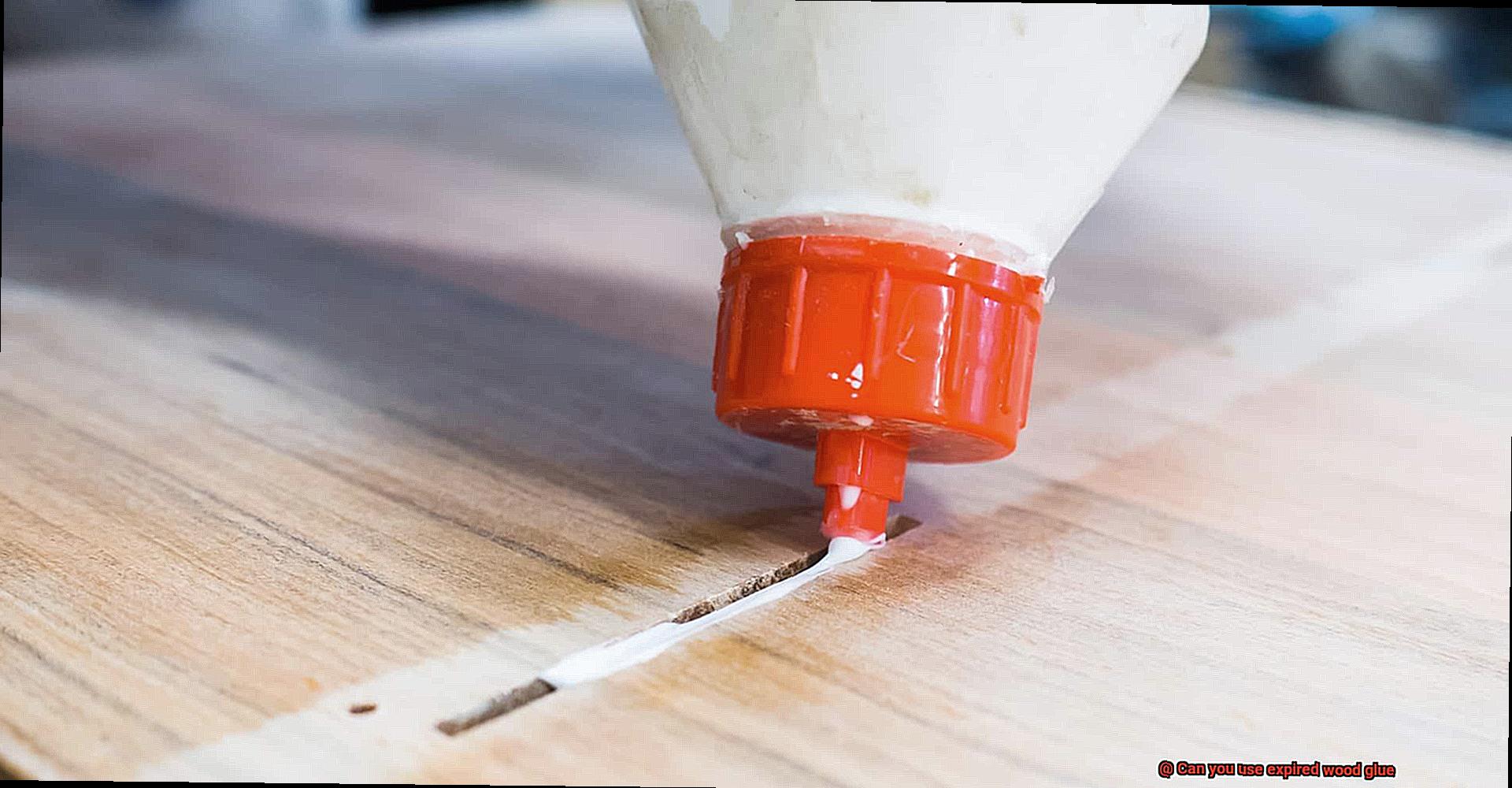
Expired wood glue results in weak joints that are prone to breaking or coming apart over time. By checking the expiration date, you minimize the risk of structural instability and potential safety hazards.
Quality assurance:
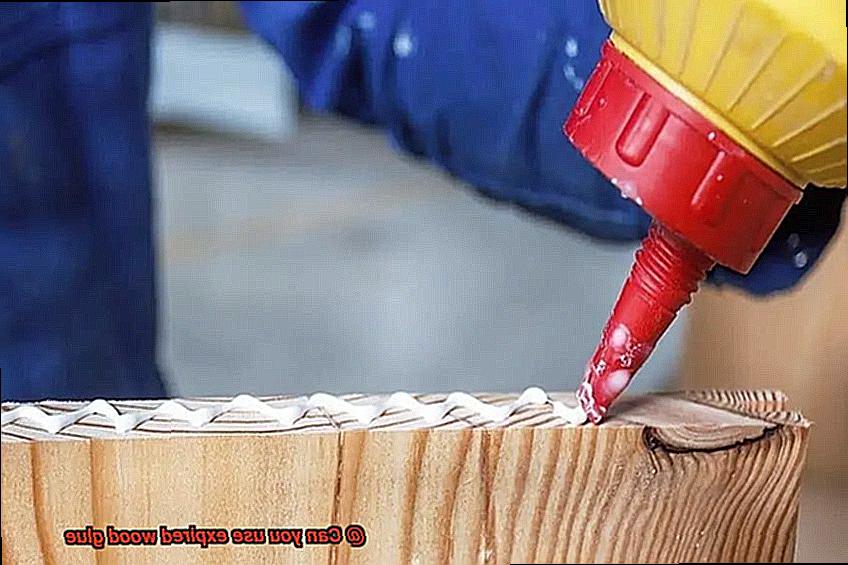
Adhering to the manufacturer’s recommended shelf life ensures that you are using a reliable product that has been tested for durability and performance. It instills confidence in the glue’s ability to provide the necessary bond for your woodworking projects.
Why is Using Expired Wood Glue Not Recommended?
Wood glue is an essential tool in woodworking projects, providing the adhesive power necessary to create strong and durable bonds. However, using expired wood glue can lead to disastrous consequences. In this article, we will explore the reasons why it is not recommended to use expired wood glue. By understanding the potential issues with expired glue, you can ensure the success and longevity of your woodworking projects. Let’s delve into the sticky truth.
Loss of Effectiveness:
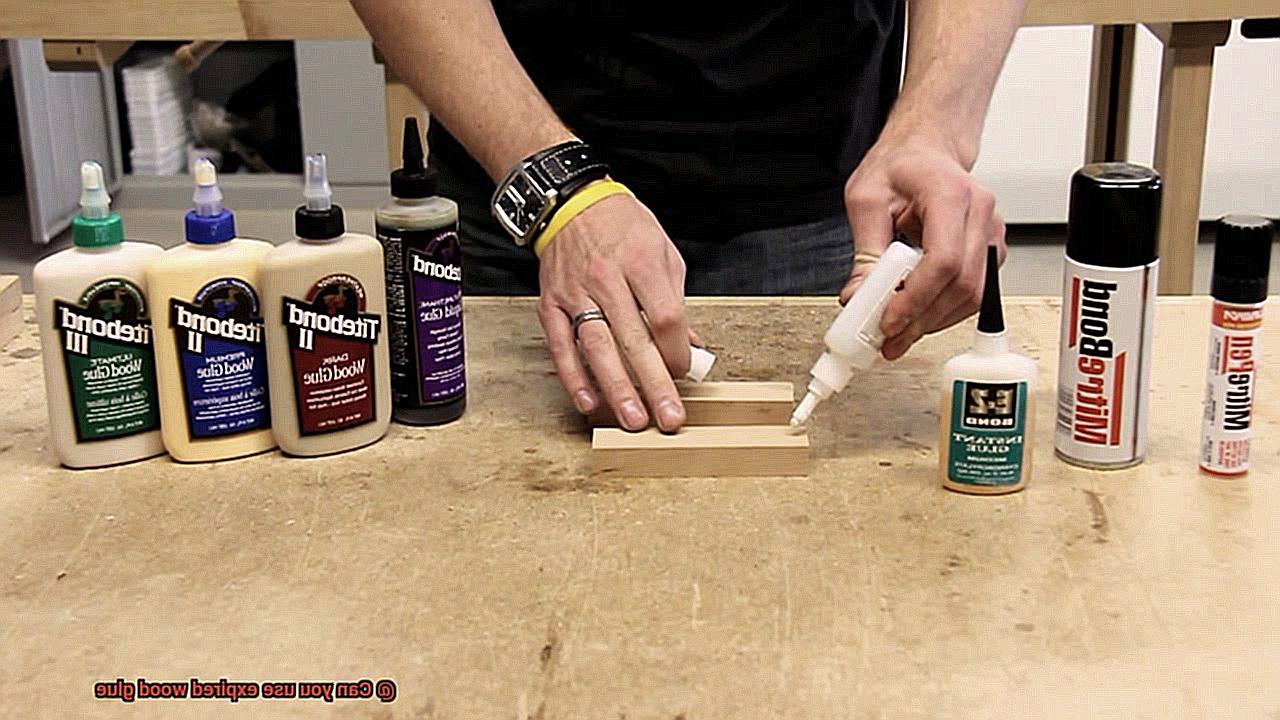
Just like food and medicine, wood glue has an expiration date for a reason. Over time, the adhesive properties of wood glue can deteriorate, resulting in weak bonds that may not hold up over time. Imagine spending hours crafting a beautiful piece of furniture, only to have it fall apart because the glue lost its effectiveness. This can be a major disappointment and waste of time and effort.
Changes in Chemical Composition:
Wood glue is a complex mixture of polymers, solvents, and additives that work together to create strong bonds. However, as the glue ages, these chemical components can break down or evaporate, compromising the overall quality and performance of the adhesive. This can lead to decreased bonding strength and structural integrity, which is not ideal when working on projects that need to withstand the test of time.
Uneven Application:
Expired wood glue may not spread evenly or adhere properly to surfaces. As it ages, wood glue can become thicker or more viscous, making it difficult to apply smoothly. This uneven distribution of adhesive can result in weak spots or incomplete bonding, which can cause problems down the line. Projects may fail or require additional repairs due to inadequate bonding caused by expired glue.
Project Failures and Costly Repairs:
Using expired wood glue can result in project failures or the need for costly repairs. Picture this: you have just completed a stunning woodworking project, feeling accomplished and proud, only to have it fall apart because the glue failed. Ineffective or expired glue can undermine the structural integrity of your projects, leading to disappointment and additional expenses. To avoid such frustrations and unnecessary expenses, it is crucial to invest in fresh and reliable wood glue.
Safety Concerns:
While using expired wood glue may not pose immediate physical harm, its compromised performance can lead to safety risks. Imagine a chair collapsing unexpectedly because the glue did not hold up its end of the bargain. This could result in injuries or accidents. Prioritizing safety means using fresh and reliable wood glue to ensure the structural integrity of your projects.
What Are The Negative Effects of Using Expired Wood Glue?
Wood glue is a crucial component in woodworking projects, providing the necessary adhesive strength to hold wood pieces together. However, using expired wood glue can have detrimental effects on your projects, compromising their integrity and longevity. This article explores the potential risks of using expired wood glue and highlights the importance of using fresh glue for optimal results.
Weaker Bond Strength:
Expired wood glue loses its adhesive properties over time, resulting in a weaker bond between wood surfaces. This can lead to joints or projects failing, posing safety hazards and causing frustration.
Improper Drying:
Expired wood glue may not cure or harden properly, leaving it tacky or sticky even after extended periods. This compromises the integrity of the bond and affects the overall quality of your project.
Insufficient Bonding Strength:
Using expired wood glue increases the risk of insufficient bonding strength. The diminished adhesive properties can result in a weak bond that may not withstand long-term use or environmental factors like humidity and temperature changes.
Negative Impact on Appearance:
Expired wood glue can negatively impact the appearance of your finished project. It may discolor or leave residue on the wood’s surface, affecting its aesthetic appeal. Additionally, improperly drying glue can create uneven or lumpy areas, compromising the smoothness and finish of your work.
Wasted Time and Money:
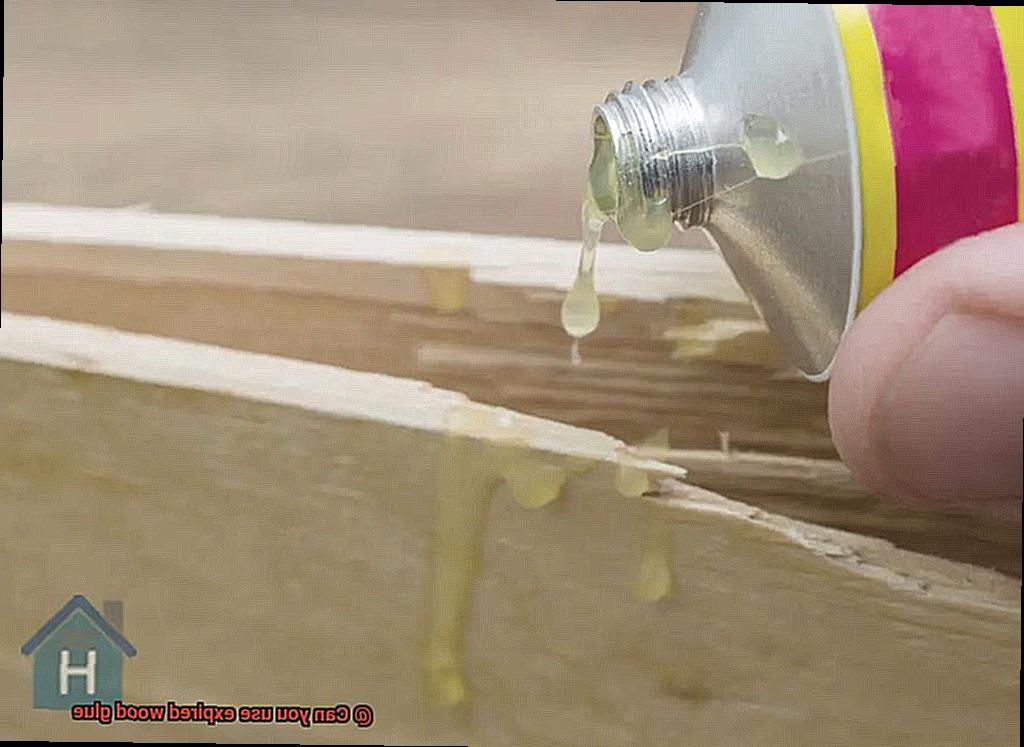
Using expired wood glue can lead to wasted time and money. If the glue fails to create a strong bond or doesn’t dry properly, it may require rework or repairs, resulting in additional costs and delays. Moreover, project failure due to weak bonding caused by expired glue can lead to material wastage and the need to start from scratch.
Compromised Quality and Longevity:
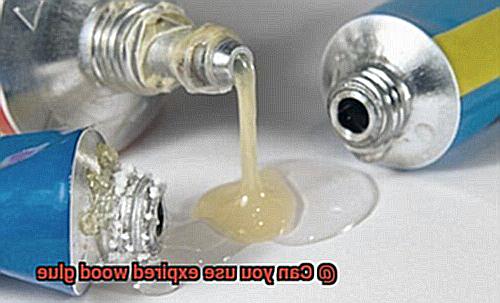
The weak bond created by expired wood glue may not withstand long-term use or environmental factors, reducing the quality and longevity of your woodworking projects. Joints may loosen over time, and the overall durability of the woodwork may be compromised.
How To Determine If Your Wood Glue Is Expired?
Determining if your wood glue is expired is crucial for the success of your woodworking projects. Here are five key factors to consider when assessing the condition of your wood glue.
Expiration Date:
The first thing to check is the expiration date on the bottle or packaging. Most wood glues have a shelf life of about one to two years. If the glue has surpassed its expiration date, it’s best to err on the side of caution and get a new bottle. Expired wood glue may not have the same adhesive properties as fresh glue, which could lead to weaker bonds and potential project failure.
Consistency:
Examining the consistency of your wood glue is another way to determine if it has expired. Fresh wood glue should have a smooth and even texture, similar to that of honey. Any clumps, curdling, or separation in the glue could indicate that it has expired and should not be used. A compromised consistency could affect the glue’s ability to spread evenly and penetrate into the wood fibers for a strong bond.
Smell:
Giving your wood glue a sniff can also provide insight into its freshness. Fresh wood glue typically has a mild and slightly sweet odor. If you detect any unusual or foul smells coming from the glue, it could indicate that it has gone bad. Using expired wood glue with a strong chemical odor could compromise the quality of your woodworking projects.
Bonding Effectiveness:
Expired wood glue may not bond as effectively as fresh glue. Over time, the chemicals in the glue can break down and lose their adhesive properties. This can result in weaker bonds and potentially lead to project failure or damage. To ensure the best results, it’s recommended to use fresh wood glue rather than expired ones.
Storage Conditions:
Proper storage is essential for prolonging the shelf life of your wood glue. Keep the glue in a cool and dry place, away from direct sunlight and extreme temperatures. Seal the bottle tightly after each use to prevent air exposure, which can accelerate the expiration process.
Is It Safe to Use Slightly Expired Wood Glue?
Wood glue is a staple adhesive in woodworking projects, but what about when you come across a bottle that’s slightly past its expiration date? Can you still use it safely? In this article, we’ll delve into the safety considerations of using slightly expired wood glue. We’ll examine the condition of the glue, potential risks and advantages, and factors to consider when making a decision for your woodworking projects.
Assessing the Condition of Slightly Expired Wood Glue:
- Check the Expiration Date: Like many products, wood glue has an expiration date. If your wood glue is only slightly past its expiration date, it may still be usable for certain applications.
- Inspect Consistency and Appearance: Before using slightly expired wood glue, examine its consistency. If the glue appears separated, lumpy, or has an off texture, it indicates deterioration and should not be used. However, if the glue flows smoothly and looks normal, it may still be suitable.
Potential Risks and Advantages:
- Weaker Bond Strength: Slightly expired wood glue can result in weaker bonds compared to fresh glue, potentially leading to reduced structural integrity and joint failure over time.
- Testing Bond Strength: To ensure reliability, test the bond strength of expired wood glue before using it for critical or load-bearing applications. Apply the glue to scrap pieces of wood and subject them to stress or pressure to evaluate the strength of the bond.
- Non-Critical Applications: Slightly expired wood glue may still serve its purpose adequately for non-critical applications where strength is less of a concern, such as temporary or decorative projects.
Making the Best Decision:
Consider these factors when deciding whether to use slightly expired wood glue:
- Project Requirements: Assess the specific project requirements and determine if the slightly weaker bond strength of expired glue is acceptable.
- Potential Risks: Evaluate the potential risks and consequences of using slightly expired wood glue, especially for critical or load-bearing applications.
- Storage and Handling: Properly store wood glue in a cool, dry place and tightly seal the container after each use to prolong its shelf life and maintain effectiveness.
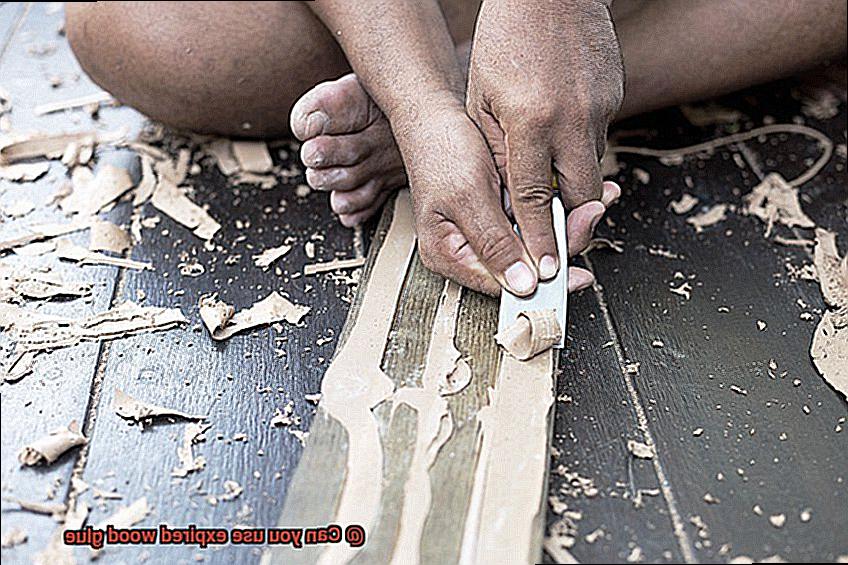
How To Maximize Performance When Using Fresh, Non-Expired Wood Glue?
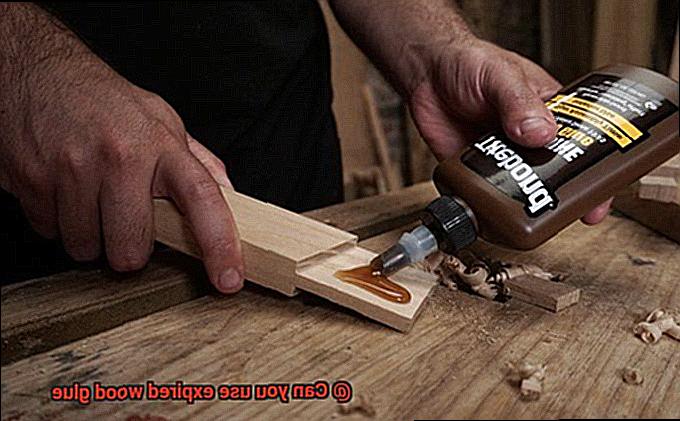
Wood glue is an essential component in woodworking projects, providing the strong and durable bonds necessary for long-lasting joints. When using fresh, non-expired wood glue, there are key factors to consider to maximize its performance. In this comprehensive essay, we will explore these factors in detail, ensuring that your woodworking projects achieve optimal results.
Proper Storage:
To maintain the adhesive properties of fresh, non-expired wood glue, it is crucial to store it correctly. Keep the glue in a cool and dry place, away from moisture and extreme temperatures. By doing so, you prevent any potential changes in viscosity or adhesive strength that could compromise the overall performance of the glue.
Surface Preparation:
Before applying wood glue, prepare the surfaces that will be bonded. Ensure they are clean, dry, and free from any dust or debris. Use a clean cloth or brush to remove loose particles. Consider lightly sanding the surfaces to create a rougher texture, promoting better adhesion between the wood and glue.
Proper Application:
Applying the right amount of wood glue is vital for strong and effective bonds. Follow the manufacturer’s instructions regarding the recommended amount of glue for your specific project. Applying too little glue can result in weak bonds, while excess glue can lead to messy joints and excessive squeeze-out.
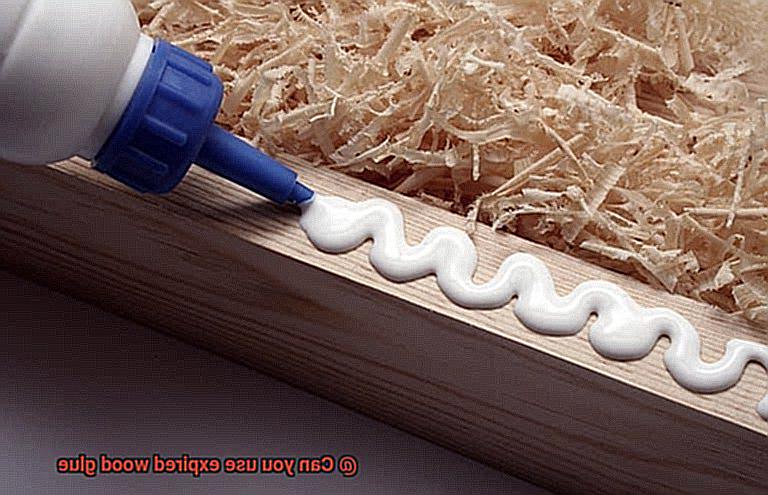
Correct Clamping:
Proper clamping is essential to maximize the performance of wood glue. Apply sufficient pressure using clamps or other suitable methods to hold the glued surfaces firmly together. This ensures that the bond is secure and minimizes any potential gaps between the pieces.
Sufficient Drying Time:
Allow ample drying time for the wood glue to cure properly. While some glues may dry relatively quickly, it is advisable to leave clamped pieces undisturbed for at least 24 hours or follow the specific drying time recommended by the manufacturer. This ensures that the bond reaches its maximum strength and durability.
What Are The Best Practices for Storing and Disposing of Expired Wood Glue?
In the world of woodworking, wood glue is the unsung hero that holds everything together. But what happens when your trusty adhesive reaches its expiration date? This blog post explores the best practices for storing and disposing of expired wood glue, ensuring both the longevity of your projects and your commitment to environmental responsibility.
Storing Expired Wood Glue:
Proper storage is crucial to extending the lifespan of your wood glue. Here are some tips to keep in mind:
- Store in a cool, dry place: Moisture and heat degrade wood glue’s quality, so find a cool and dry spot to stash it away.
- Keep the container tightly sealed: Air exposure compromises adhesive effectiveness, so seal the container tightly after each use.
Checking for Signs of Expiration:
Before using expired wood glue, it’s important to check for signs of spoilage:
- Consistency check: Expired wood glue may become thicker or thinner than usual – any significant changes should deter usage.
- Discoloration assessment: Exposure to sunlight or extreme temperatures alters wood glue’s color. Any noticeable discoloration indicates expiration.
- Smell test: Fresh wood glue has a mild, slightly sweet scent; a strong, unpleasant odor suggests spoilage.
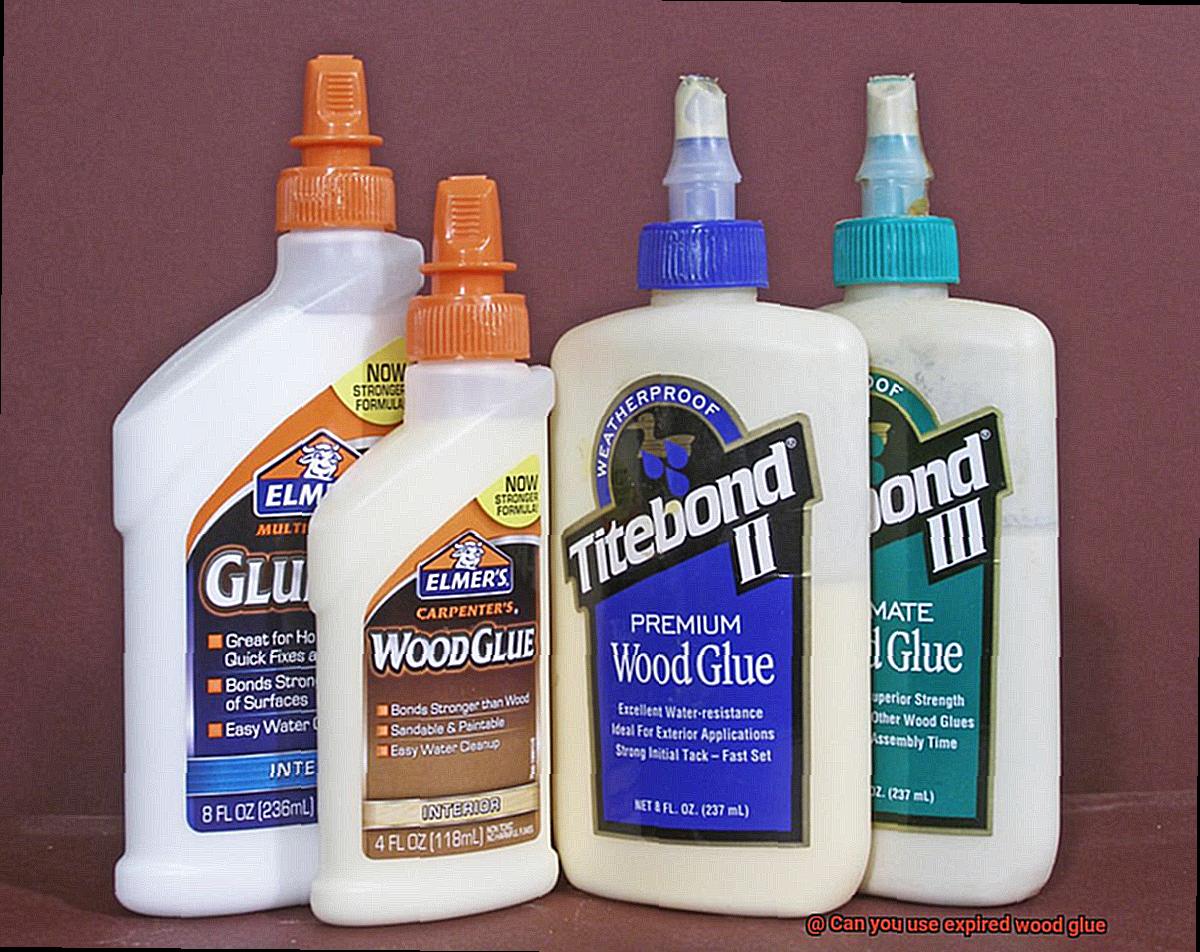
Disposing of Expired Wood Glue:
When bidding farewell to expired wood glue, follow these disposal tips:
- Check local regulations: Different areas have specific guidelines for adhesive disposal. Contact your local waste management facility for proper methods.
- Avoid drain disposal: Wood glue contains chemicals harmful to the environment, so never pour it down the drain or flush it down the toilet.
- Solidify before disposal: Open the container and allow the wood glue to completely dry and solidify. Once solid, dispose of it in the regular trash.
- Explore recycling options: Some recycling centers accept specific adhesive types for proper disposal. Research facilities specializing in recycling or hazardous waste disposal.
-rcdfvNkxUY” >
Conclusion
In conclusion, it is strongly advised against using expired wood glue for a multitude of reasons. Firstly, as the glue ages, its viscosity undergoes changes that make it incredibly difficult to spread evenly. This can result in weak joints and uneven bonding, compromising the integrity of your woodworking projects. Secondly, the chemical composition of expired wood glue deteriorates over time, leading to a significant loss of bonding strength. This means that even if you manage to apply it evenly, it simply won’t hold up as well as fresh glue.
To make matters worse, expired wood glue can develop unsightly lumps and clumps or emit an unpleasant odor – clear signs that it has undergone deterioration and is no longer suitable for use. It’s like trying to stick together pieces of wood with a subpar adhesive that’s past its prime – a recipe for disaster.
Checking the expiration date becomes absolutely crucial when working with wood glue. By using fresh adhesive, you can harness its full adhesive properties and ensure strong and reliable joints in your woodworking projects. Not only does this guarantee optimal performance, but it also minimizes the risk of structural instability and potential safety hazards.
Ultimately, relying on expired wood glue is a surefire way to invite project failures, costly repairs, and compromised quality in your woodworking endeavors. To avoid these headaches altogether, always check the expiration date before use and invest in fresh and reliable wood glue for optimal results.
Remember to store your wood glue properly in a cool and dry place with a tightly sealed container. When disposing of expired wood glue, be sure to follow local regulations. Avoid drain disposal by allowing the glue to solidify before throwing it away or explore recycling options if available.

